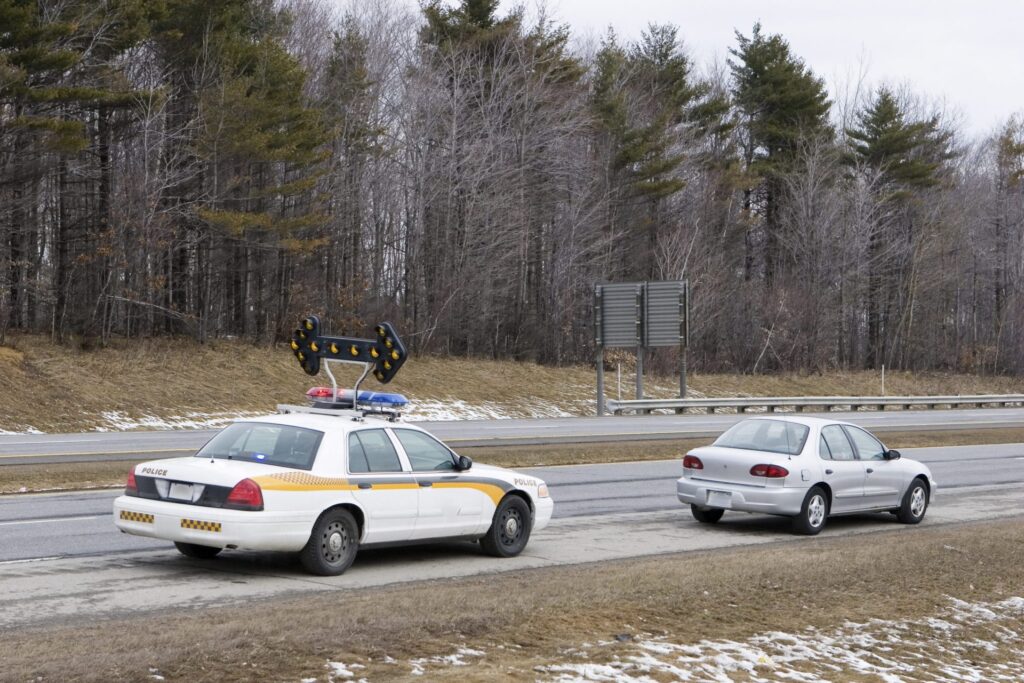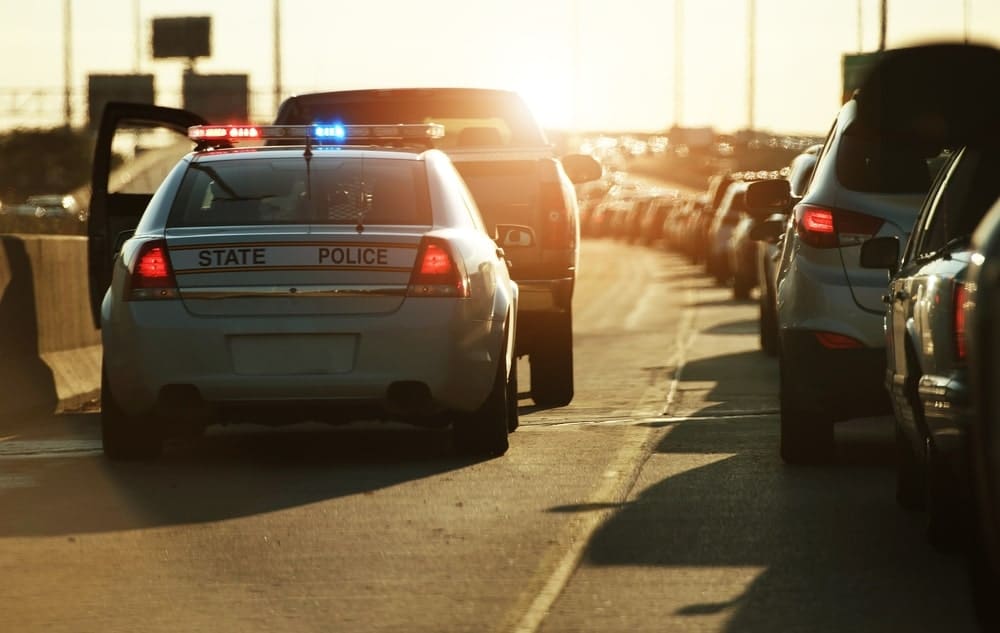It’s your worst nightmare. You’re pulled over on the roads by Maine law enforcement, questioned, tested, and then charged with OUI or another crime.
You’re just pondering the serious consequences of the events when your criminal defense lawyer calls you. After examining the evidence, it seems that the traffic stop was illegal in the first place because the search and seizure rules were not followed.
The case is dismissed.
This happens more than people realize. In the U.S. more than in almost any other country in the world, you have inalienable rights and protections according to the U.S. Constitution.
In particular, the Fourth Amendment requires that a police officer has reasonable suspicion that a crime has been committed before “seizing” a person.
Understanding the search and seizure rules puts you in a much better position to handle a traffic stop (or any other police investigation against you) in the future.
Call 207-571-8146 or contact us online to schedule a consult with one of our highly skilled criminal defense & OUI lawyers, serving Southern Maine, today.
Table of Contents
What are your rights during a traffic stop in Maine?
Search and seizure rules are not just for investigations concerning drug crimes or acts of theft.
You may not consider a traffic stop as a type of “seizure” but if a government law officer signals with emergency lights or a siren to pull over a driver, it is considered an act of seizure.
Both state and federal officers patrolling U.S. roads are therefore subject to the search and seizure rules outlined in the U.S. Constitution.
For a warrantless search, there must be reasonable suspicion that a crime has been committed or is about to be committed. So, at the moment of seizure (at the signal to pull over), the officer must be able to demonstrate reasonable suspicion, regardless of what happens afterwards.
There are several legitimate ways to establish reasonable suspicion –including observations of a person’s erratic or dangerous driving, a driver using their phone while driving or a radio dispatch about a child passenger not wearing a seatbelt. Even minor defects, such as no tag light are enough to justify a police officer’s stop.
But officers cannot just pull you over for no reason or simply act on a “hunch”.
Apart from understanding this important right, you have other rights if you hear the sirens wailing behind you and get the signal to pull over. These include:
- The right to remain silent. You can politely tell the police officer that you wish to remain silent and not answer questions.
- The right to a lawyer if taken into custody: if arrested, you can immediately request a criminal defense attorney.
- The right to ask if you are under arrest. If not, you have the right to ask if you are free to leave.
- The right to refuse consent to a search of yourself or your vehicle. Unless consent is provided, the officer is not entitled to check your person or anywhere in the vehicle for anything unlawful.
- Constitutional rights when arrested: regardless of your citizenship status.
If any of these rights are violated during a traffic stop in Maine, it may be illegal and the evidence may be made inadmissible – usually leading to the dismissal of the case against you.
4th Amendment limits to a vehicle search and seizure
The Fourth Amendment of the United States Constitution says the following:
“The right of the people to be secure in their persons, houses, papers, and effects, against unreasonable searches and seizures, shall not be violated, and no Warrants shall issue, but upon probable cause, supported by Oath or affirmation, and particularly describing the place to be searched, and the persons or things to be seized.”
The “exclusionary rule,” empowers a judge to throw out all evidence gathered after a fourth amendment violation
As already established, turning on emergency lighting to signal a traffic stop is the start of the seizure process. Unless there is a reasonable suspicion at that precise moment, what happens afterwards may not matter – even if open containers of alcohol are found in the vehicle, they may not be admissible evidence in court.
This right has been applied to many pre-trial motions over the years, resulting in many dismissed cases.
Call 207-571-8146 or contact us online to schedule a consult with one of our highly skilled criminal defense & OUI lawyers, serving Southern Maine, today.
What if the police were wrong about the basis of the traffic stop?
Your case has more chance of being dismissed if the officer who stops you argues that he had reasonable suspicion, but that reasonable suspicion turned out to be wrong.
For instance, if the officer stopped you because he believed that no seatbelt was worn by a child passenger but finds out after the stop that the child was wearing a seatbelt, your lawyer may argue that the stop was not “reasonable”.
Your criminal defense lawyer will examine all the “discovery” materials from the prosecutor, including video evidence, audio calls, etc. to search for weaknesses in the case against you.
A major weakness will be anything that suggests an illegal stop. For instance, if a police officer pulled you over for “acting suspiciously” or “driving slowly in a dangerous area” but no traffic offense was committed, it might be classed as an illegal stop.
What protocols must police follow during a traffic stop in Maine?
Because of the search and seizure rules, police in Maine must follow strict procedures if they are hoping for a conviction for a crime.
You already know about the need for reasonable suspicion of a crime being committed. Law enforcement must also:
- Get your consent to search your person or vehicle unless they have a properly obtained and administered warrant (they can, however, pat down your clothing if they suspect you have a weapon)
- Only arrest you if they have probable cause of criminal activity
- Read your Miranda rights to you once you are taken into custody
Even when conducting sobriety checkpoints, the police must follow these protocols for their actions to be lawful.
What should I do if my traffic pullover was illegal?
If you believe that your traffic stop was illegal or your rights were violated, you should waste no time discussing your case with a criminal defense lawyer.
Even if you are unsure, or you think that the evidence against you is strong, let an experienced defense lawyer assess your case. Never simply plead guilty because the immediate and long-term consequences of a criminal conviction can be severe for you.
If anything was illegal with your stop, we will file a motion to suppress with the court, which can mean that the evidence against you is thrown out.
Start by speaking to a lawyer at The Maine Criminal Defense Group for an honest assessment of your case.
Call 207-571-8146 or contact us online to schedule a consult with one of our highly skilled criminal defense & OUI lawyers, serving Southern Maine, today.
Blog Posts

If you receive a traffic ticket in Maine, you may be facing far more than demerit points or an administrative penalty. You could be facing criminal sanctions and a permanent[...]

Many drivers in Maine who receive a traffic ticket for speeding or another infraction simply pay it without thinking twice. That can be a mistake. Not only does it mean[...]

Under the Maine Criminal Code, if you are involved in a collision with a motor vehicle, you are required to stop at the scene immediately – or if you have[...]

Title 29-A of the Maine Revised Statutes lists several driving related crimes with a list of minimum criminal consequences if you are convicted. Some of these consequences include a court[...]

If a police officer is going to pull you over for drunk driving, they need to have probable cause that you’re violating the law before they put on their lights[...]

If you’ve been recently convicted of operating a vehicle while under the influence of alcohol (OUI), then you probably had your license suspended. However, if you desperately need you driving[...]

There are lots of ways to break the law that involve how you use your car. Luckily, many of them are minor traffic offenses, like parking tickets. Even a speeding[...]

A criminal speeding charge in Maine might seem like an impossible thing to beat. After all, it’s a relatively easy crime to prove: All it takes is the reading of[...]


